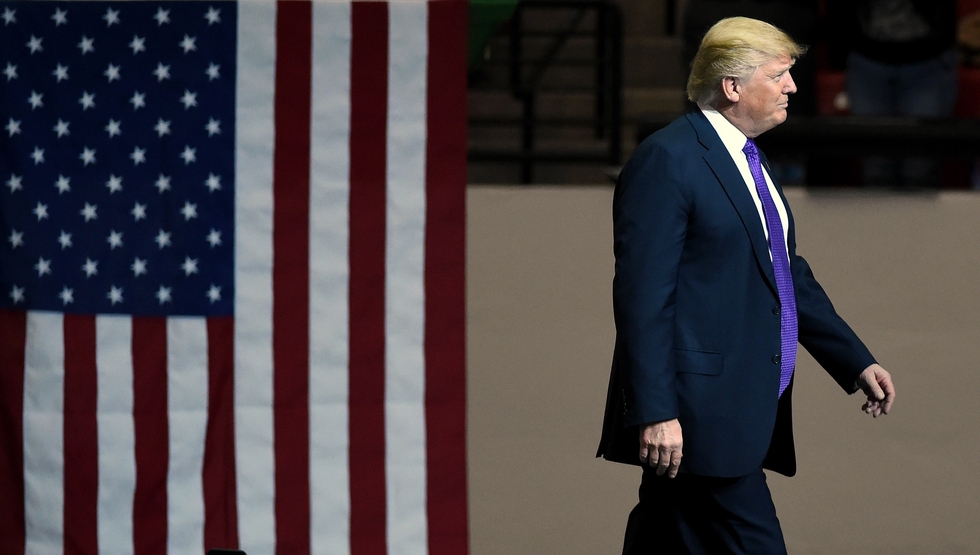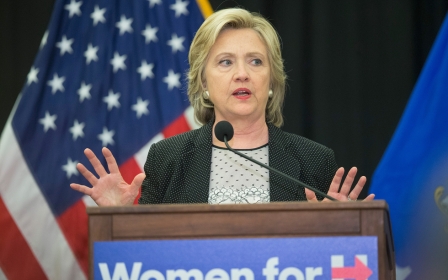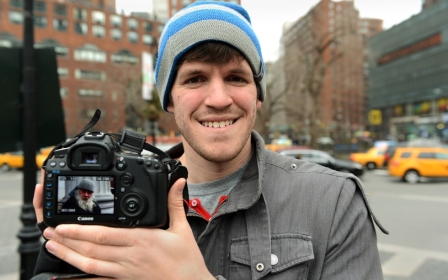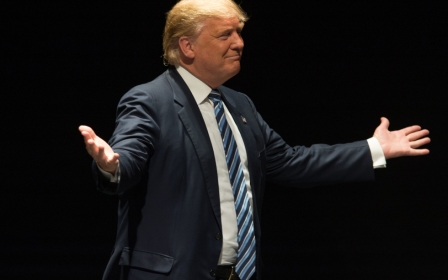Pro-Israel lobby in uproar over 'neutral' Trump

NEW YORK, United States – It may seem self-evident that a “neutral” broker should manage negotiations between adversaries.
Not so, when it comes to Israeli-Palestinian violence. At least, that is the message ahead of the American Israel Public Affairs Committee (AIPAC) policy conference that starts in Washington on Sunday.
Ever since Donald Trump, the frontrunner for the Republican nomination, promised to be a “neutral” negotiator between Israelis and Palestinians, his intentions behind that phrase have been scrutinised by analysts.
“It’s a very significant distinction from his opponents,” Yousef Munayyer, director of the US Campaign to End the Israeli Occupation, told Middle East Eye.
In the absence of the US president and the Israeli prime minister, Trump, together with the Democratic frontrunner Hillary Clinton, among other White House hopefuls are headlining this year’s AIPAC conference.
According to Munayyer, conference die-hards are used to watching politicians from both sides of the aisle take to the stage and offer their “undying, never-ending, complete devotion to the state of Israel”.
“Now, they have Trump, who is not as committed to Israel,” Munayyer said.
“He has distanced himself from the neoconservative faction of the party, which has dominated the Republican foreign policy establishment over recent years.”
Trump departs from Republican norms by vowing to be a “neutral” broker between Israelis and Palestinians, expressing isolationist tendencies, including a criticism of the 2003 invasion of Iraq, and rejecting free trade.
An Israel-Palestine accord is the “toughest deal in the world” to reach and only gifted dealmakers, like Trump, should try, he said. But experience in property negotiations might not be enough, he acknowledged.
After making those comments, Trump was attacked by Republican rivals Marco Rubio and Ted Cruz for not backing Israel to the hilt. Later, he changed tack, citing his appearance at a pro-Israel parade and his daughter’s conversion to Judaism.
According to Aaron Miller, a former State Department adviser, much hinges on what Trump tells AIPAC.
“The question is whether he will part from his counter-intuitive script,” Miller, from the Wilson Center think tank, told MEE.
Trump is the “only candidate” in the 2016 White House race who has made reviving the moribund peace process a priority, he added. His position on neutrality “reflects his conviction that he is the best negotiator in the world”.
The billionaire gets a mixed reaction from American Jews. A group of liberal rabbis, vexed by his demagogic nationalism and diatribes against Muslims and Mexicans, will demonstrate at AIPAC, which runs in Washington from 20-22 March.
As victims of historic racism, Israel loyalists will have “tremendous ambivalence” to Trump’s support among angry, white supremacists, Jonathan Cristol, a scholar with the World Policy Institute, a think tank, told MEE.
But parts of the Jewish Republican establishment may be getting used to Trump. Sheldon Adelson, a Las Vegas casino tycoon and political funder, said he could back the New York billionaire. “Why not?” he reportedly said.
Israel depends on US military and diplomatic support. The two countries are currently negotiating how much Washington will give Israel once their current military deal, worth about $3bn annually, expires in 2018.
Israelis and their supporters in Washington obsess over a relationship that has been strained in recent years by tensions between US President Barack Obama, a Democrat, and right-wing Israeli Prime Minister Benjamin Netanyahu.
Their relationship has yet to recover from last year’s row over a US-led international nuclear deal with Iran, Israel’s arch foe, which saw Netanyahu woo Republicans and bad-mouth Obama in Congress for undermining Israel’s security.
Perhaps reflecting this sourness, Obama will travel to Cuba on Monday and leave Vice President Joe Biden to talk at AIPAC. Netanyahu will address the crowd of lawmakers, academics and others via satellite.
According to Munayyer, Trump’s rise is a reckoning for Netanyahu, who burned his bridges with Democrats and courted a Republican establishment that is being trounced in the presidential race by a maverick outsider.
“Israel’s prime minister loves boasting about his unique understanding of America’s domestic politics and how he can operate and manipulate in that arena. He put his eggs in the Republican basket, and away from the Democrats,” Munayyer said.
“But the Republican Party is not what it was just two years ago. It’s being led by a front-runner in Trump who is not somebody that you would think the Israeli prime minister would want to associate with.”
Countering Trump’s unpredictability, Clinton’s track record in Congress and as Secretary of State makes her a known quantity.
“I suspect most AIPAC members do not think Trump will be the next president and, if anything, he guarantees that Clinton wins in 2016,” said Cristol.
“Though she’s been accused of being too close to the Palestinians, those accusations are from many years ago. There’s little doubt she is strongly in the pro-Israel camp.”
Clinton is widely viewed as hawkish by Democratic standards, arguing for humanitarian interventions and deployment of US military muscle overseas, including in Afghanistan, Iraq, Libya and Syria.
The former first lady has regularly asserted support for Israel’s security and backed its use of military force in Gaza, helped defend Israel at the UN Security Council and denounced Palestinian armed struggle and propaganda.
She does, however, back the Iran deal that Netanyahu abhors and criticises Israeli settlement-construction on Palestinian turf.
Last year, she told a Washington think tank she would invite Netanyahu for White House talks during her “first month in office,” were she elected president, and “deepen America’s unshakeable commitment to Israel’s security”.
“Clinton knows the Israelis extremely well and she’ll probably be much less willing to pick unproductive fights with Israel than Obama,” Miller said.
“Obama became a master at provoking unproductive fights, although fighting with Israel is critically important if you want to get anything done on the Arab-Israeli issue. But that’s dead, for the time being anyway.”
It does not end with Trump and Clinton.
Cruz and Ohio governor John Kasich, who both seek the Republican nomination, are set to address AIPAC. They are both vocal Israel-supporters, but neither has shown that they can derail Trump’s run for the Oval Office.
The same goes for Clinton’s rival for the Democratic nomination, Bernie Sanders. Echoing Trump’s neutrality, Sanders has called for a “level playing field” in Israeli-Palestinian talks.
The 75-year-old Jewish democratic socialist, who garners much support among college-age voters as well as among Arab and Muslim Americans, has confirmed he will not be speaking at AIPAC's three-day event. He said on Friday that it conflicts with his campaign schedule out west.
More than 5,000 people, including the Pink Floyd musician Roger Waters, had put their names to an online petition urging Sanders to shun AIPAC. Organisers criticise the organisation’s “racist, militaristic and anti-democratic policies”.
Seth Morrison, a campaigner for Jewish Voice for Peace, a left-wing pressure group, is organising protests outside AIPAC. He does not believe that strong US-Israel ties will loosen any time soon, he said.
“This is a conference about blind support for Israel,” Morrison told MEE.
“Unfortunately, all the candidates have given undue and undeserved support to Israeli militarism and occupation. I think the only way Israel is going to change its ways is when the US stops sending arms.”
Middle East Eye propose une couverture et une analyse indépendantes et incomparables du Moyen-Orient, de l’Afrique du Nord et d’autres régions du monde. Pour en savoir plus sur la reprise de ce contenu et les frais qui s’appliquent, veuillez remplir ce formulaire [en anglais]. Pour en savoir plus sur MEE, cliquez ici [en anglais].




